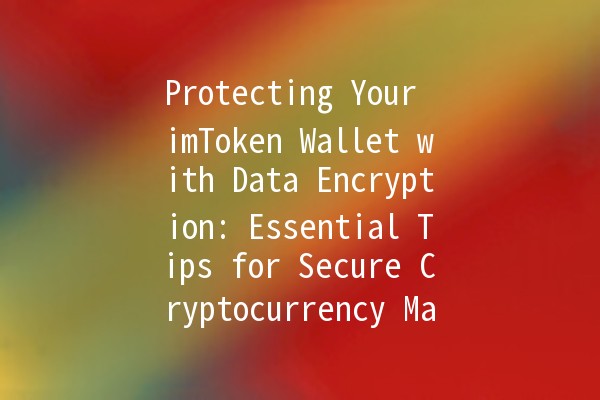In the fastpaced world of cryptocurrency, security remains a paramount concern for users and investors alike. As the digital landscape evolves, so do the methods hackers employ to infiltrate wallets and exchange platforms. The imToken wallet is a popular option for many cryptocurrency enthusiasts due to its robust features, including excellent security measures. However, ensuring the protection of your assets goes beyond simply relying on the wallet's builtin features; it requires a proactive approach to data encryption and security practices. Here, we'll dive deep into how you can harness data encryption to bolster the security of your imToken wallet, along with a range of practical tips and techniques.
Before we explore specific techniques to secure your imToken wallet, it's essential to understand what data encryption is and why it's critical for cryptocurrency wallets.

Data encryption is the process of transforming information into a code to prevent unauthorized access. This means that even if someone were to intercept your data, they would not be able to understand it without the correct decryption key. For cryptocurrency wallets, encryption protects sensitive information such as private keys, transaction history, and account details.
The imToken wallet employs advanced encryption protocols, but users can enhance their security with additional measures. Now, let’s explore some effective tips for securing your imToken wallet.
One of the first lines of defense in keeping your imToken wallet secure is a strong password. A robust password should be unique, complex, and at least 12 characters long. It should include a mix of uppercase and lowercase letters, numbers, and symbols.
Avoid common words or easily guessable information like birthdays.
Consider using a password manager to generate and store complex passwords.
Twofactor authentication adds an extra layer of security to your account by requiring a second form of verification in addition to your password. This could be a code sent via SMS, an email, or an authentication app like Google Authenticator.
Activate 2FA in the imToken wallet settings.
Whenever you log in or make a transaction, be prepared to verify your identity using your chosen method.
Regular updates to your wallet software ensure you’re protected against the latest vulnerabilities. Developers frequently release patches to address security flaws and improve overall performance.
Enable automatic updates if available.
Regularly check for updates on your device and the imToken wallet application.
Your backup seed phrase is crucial for recovering your digital assets if you lose access to your wallet. However, if someone gains access to this phrase, they can compromise your wallet.
Write down your seed phrase and store it in a secure location, like a safe.
Consider encrypting a digital version of your seed phrase using encryption software.
Using public WiFi networks can expose you to significant security risks, making it easier for hackers to intercept your data. When accessing your imToken wallet, especially for transactions, always use a secure, private internet connection.
Avoid logging into your cryptocurrency wallet when connected to public WiFi.
Use a Virtual Private Network (VPN) to secure your internet connection when necessary.
Beyond the immediate protections you can implement, it's wise to consider broader security practices. Here are additional strategies to help secure your digital assets:
Phishing is a common method used by cybercriminals to trick users into providing personal information. Be vigilant about emails or messages that ask for sensitive information, especially if they appear to come from legitimate companies.
Keeping a close eye on your wallet can help you catch any unauthorized activity early.
Be selective about where and how you access your cryptocurrency wallet. Avoid accessing it on shared or public devices.
If you hold significant amounts of cryptocurrency, consider using a hardware wallet for longterm storage. These devices offer an isolated environment for your private keys and are less vulnerable to online threats.
Create regular backups of your wallet and ensure they are stored securely. In the event of a device failure or loss, having a backup can save your assets.
If you've forgotten your password, you'll need access to your backup seed phrase. Open the imToken app, select "Recover Wallet," and enter your seed phrase. Ensure you keep your seed phrase secure for future recovery needs.
If you suspect unauthorized access, immediately transfer your assets to a different wallet. Ensure the new wallet has enhanced security measures enabled.
Yes, using multiple wallets—such as a combination of a hot wallet (like imToken) for daily transactions and a cold wallet for longterm storage—can enhance your security.
While it can be convenient, linking your wallet to an exchange can increase risk. Ensure you use secured methods when making transactions and enable all security features the exchange offers.
Yes, installing antivirus software can help detect and eliminate malware that may compromise your wallet's security.
Regularly changing your password—in particular, if you have any suspicion that it might be compromised—is advisable. Every six months is a good rule of thumb.
Securing your imToken wallet through effective data encryption practices is essential in today's cryptocurrency landscape. Given the growing number of cyber threats, adopting a proactive approach to security can help protect your assets and personal information. By implementing strong passwords, twofactor authentication, and other recommended practices, you can significantly boost the security of your wallet, allowing you to enjoy the benefits of cryptocurrency while safeguarding your investments.
In a world where security is often overlooked, taking these precautionary steps can help ensure your cryptocurrency experience remains positive and secure. Start today by assessing your current practices and making necessary changes to enhance your protection. Your cryptocurrencies deserve the best defense possible—so make security a priority!